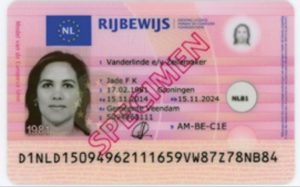Abdullah Bozkurt/Stockholm
Turkey managed to locate a dissident in the Netherlands and sought his extradition thanks to the Dutch vehicle and transport authority, which shared his Turkish driver’s license with authorities in Ankara, a document obtained by Nordic Monitor has revealed.
According to the Security Directorate General (Emniyet) document dated February 8, 2018, Turkish authorities were alerted to the location of H.U., a teacher who is a resident in the Netherlands, after Dutch national traffic authority Rijksdienst voor het Wegverkeer (RDW) shared H.U.’s information with Turkey.
That information prompted Turkish authorities to seek the possible extradition of H.U., who was wanted on bogus terrorism charges because of his alleged affiliation with the Gülen movement, a group that is critical of the government of President Recep Tayyip Erdoğan. According to Turkish government documents, he last worked as a teacher at the popular FEM prep school in Istanbul. FEM was shut down in 2016 along with thousands of private schools, associations and foundations affiliated with the Gülen group.
The document, signed by Mehmet Helvacı, acting director for the Emniyet’s Interpol-Europol section, referred to a letter by the Turkish traffic authority, which had received a letter from the RDW about H.U., who applied to exchange his Turkish driver’s license for a Dutch one. H.U. had no address registration with the Turkish Consulate, apparently for fear of prosecution by Turkish authorities.
Turkish police Interpol/Europol Department’s letter about the possible extradition of a critic in the Netherlands:
The RDW website states that a foreign driver’s license from a non-EU member state can be used for 185 days and that the exchange of a foreign license for a Dutch one is allowed in some cases. People who are able exchange licenses do not need to take a new written or driving test.
The RDW letter led the Turkish police to seek the possible extradition of H.U. either through a bilateral extradition agreement between Turkey and the Netherlands or by means of an INTERPOL Red Notice for his arrest if direct extradition was not possible. Helvacı asked the Justice Ministry to assess the best possible option to retrieve H.U. from the Netherlands.
The document’s postscript indicated that the police also informed the Ankara Chief Public Prosecutor’s Office, which in turn led the Prosecutor’s Bureau of Investigation of Crimes Against the Constitutional Order to file a petition with a court to issue an arrest warrant for H.U. on February 26, 2018. Kenan Turk, a judge at the Ankara 7th High Criminal Court, issued the warrant on the same day, making reference to internal communications on the location of H.U.

A simple cooperation scheme between the Dutch and Turkish motor vehicle authorities on driver’s licenses pushed Turkey to intensify its hunt for a critic who apparently had nothing to do with coup plotting or terrorism, charges that are often abused by the Erdoğan government to jail its opponents.
The document reveals that yet another international mechanism that was designed to facilitate coordination among traffic authorities is being abused by Turkey to hunt down critics, opponents and dissidents abroad as part of an intimidation campaign to stifle dissent and muzzle critical voices.
The Turkish government’s abuse of INTERPOL’s Notices system as well as its messaging and diffusions, especially Lost and Stolen Passports, in order to maintain pressure on government critics abroad drew harsh reaction from the INTERPOL Secretariat, which removed hundreds of filings from Turkey, citing a clear violation of the organization’s constitution.
Nordic Monitor previously published confidential documents that revealed Turkish authorities planned to circumvent INTERPOL filtering mechanisms in order to successfully obtain international warrants and notices.
Turkish judge issued an arrest warrant for a critic in the Netherlands after a letter from Dutch traffic authority RDW identified him as resident in the country:
President Erdoğan branded the Gülen movement as a terrorist organization in the aftermath of December 2013 corruption investigations that incriminated him, his family members and his business and political associates in an Iran sanctions-busting scheme. He accused the movement’s leader, Fethullah Gülen, of initiating the graft probes, an accusation that Gülen denied. The cleric, fiercely opposed to Iran’s mullah regime and highly critical of Erdoğan for aiding and abetting radical jihadist groups, has been living in self-exile in the US since 1999.
The government launched a major crackdown on the group, jailing and/or purging tens of thousands of government employees, unlawfully seizing their assets and shutting down schools, universities, NGOs, media outlets, hospitals and other entities that were owned or operated by people associated with the movement.
In 2016 Erdoğan added coup charges against Gülen, who denied any involvement in an abortive putsch that was branded by many as a false flag operation organized by President Erdoğan and his intelligence and military chiefs. Erdoğan used the event as a pretext to acquire “imperial” presidential powers, launched cross-border offensives into Syria and deployed troops to Libya and Azerbaijan.
According to official data announced in February 2021, a total of 622,646 people have faced punitive legal action in the last five years by the government due to alleged links to the Gülen movement. Of these, 301,932 have been detained and 25,467 jailed pending trial or due to conviction. Nearly 100,000 people were released under judicial supervision after imprisonment, meaning they are subject to a travel ban and are required to check in with a local police station on a regular basis.












